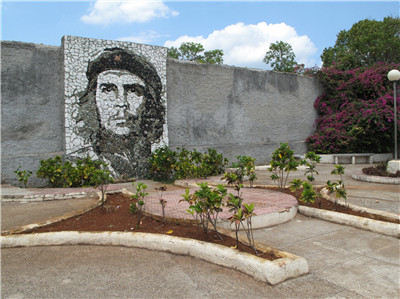(单词翻译:单击)
Cuba is using the internet to experiment with toning down its political censorship in a sign that a glimmer of glasnost has arrived on the Communist-run Caribbean island.
古巴正在利用互联网进行放宽政治审查的试验。这一迹象表明,一丝“公开化”(glasnost)的曙光已照到这个共产党执政的加勒比岛国上。
Havana’s decision to open up on the once-taboo subjects of the electoral system and civil society — by allowing Cubans to question policy in two online forums — is reminiscent of the early days of free speech in what was the Soviet Union in the 1980s.
古巴通过允许本国民众在两个在线论坛上质询政策、放开昔日禁忌话题——选举制度和公民社会——的决定,让人联想起苏联上世纪80年代开放言论自由的早期。
For a number of years there has been public discussion over the pros and cons of market-oriented reforms in Cuba, and ample criticism of the bureaucracy. But public criticism has stopped short of questioning the political status quo, aside from a fledgling dissident press, such as the online newspaper 14ymedio.com, run by writer Yoani Sánchez.
多年来,古巴国内一直有关于市场化改革利弊的公开讨论,以及大量对官僚主义的批评。但公开批评没有触及对政治现状的质疑,除了羽翼未丰的异见媒体以外,比如作家尤阿尼•桑切斯(Yoani Sanchez)开办的在线报纸14ymedio.com。
The new forums, run on state-media websites, brought together officials and academics to interact online for a few hours with an audience encouraged to send in questions and views.
这两个国家媒体网站上的新论坛,让官员和学者一起与网民进行几个小时的在线互动,并鼓励网民发布问题和观点。
The opening has some similarities to glasnost, when Soviet authorities relaxed limits on the discussion of political and social issues and allowed the freer dissemination of news. The difference is that Cuba’s move comes in the age of the internet.
这些开放性举措与前苏联的“公开化”政策有些相似,当时苏联当局放松了对讨论政治和社会问题的限制,并提高了新闻传播的自由度。不同的是,古巴此举发生在互联网时代。
The forums follow an announcement this month that the country is preparing a new electoral law, due to come into force before the next general election in 2018 when President Raúl Castro will step down, in effect ending the Castro era in Cuba that began with his brother Fidel in 1959.
这两个论坛出现之前,古巴于本月宣布正在制定新选举法,该法将在2018年下届大选举行之前生效。届时,劳尔•卡斯特罗(Raúl Castro)将卸任总统,在事实上终结其兄菲德尔•卡斯特罗(Fidel Castro)1959年开创的卡斯特罗时代。
“These openings may be small and experimental, but they signal something important: criticism becomes legitimate discourse,” Bert Hoffmann, a Cuba expert at the German Institute of Global and Area Studies in Hamburg, said.
位于汉堡的德国全球和区域研究所(German Institute of Global and Area Studies)古巴问题专家伯特•霍夫曼(Bert Hoffmann)说:“这些开放也许力度很小,而且是试验性的,但它们发出了一些重要信号:批评变成了合法言论。”
In a remarkably transparent forum on Cuba’s electoral system, sponsored by the Union of Young Communists’ daily, a participant called GCR said: “I would like to know if direct elections for the principal leadership positions of the country are under consideration . . . as the current system is [in my view] highly unpopular.”
在由古巴共产主义青年联盟(Union of Young Communists)的日报发起的一个讨论选举制度的非常透明的论坛上,一位名为GCR的参与者说:“我想知道,对国家最重要的领导职位采取直选的可能性是否正在讨论之中……因为现行制度(在我看来)非常不得人心。”
During a forum on civil society, published online this month by the Cuban Workers Federation’s weekly Trabajadores, Joan asked: “How can the Cuban Workers Federation be a non-governmental organisation when its secretary-general is a member of the Council of State?”
在一个由古巴工人联合会(Cuban Workers Federation)的周报Trabajadores本月发布上线的讨论公民社会的论坛中,Joan问道:“既然古巴工人联合会的秘书长是国务院成员,它怎么能是一个非政府组织?”
Another participant, going by the name Tumblr, charged: “The federation is an appendage of the state it represents . . . carrying out the policies of the Communist party.”
另一位网名为Tumblr的参与者指责说:“该联合会是其代表的政权的附属品……执行共产党的各项政策。”
Most of those taking part in both forums defended Cuba’s political system, but what was unique was the expression of differing political opinions.
这两个论坛的大多数参与者都为古巴的政治制度进行了辩护,特别的地方在于,不同的政治观点得到了表达。
“The debate in these forums signals a willingness on the part of authorities to allow a range of expression and acknowledge a range of opinions that were heretofore not recognised as legitimate,” William LeoGrande, a Cuba analyst at American University in Washington and co-author of Back Channels to Cuba, said.
华盛顿美国大学(American University)古巴问题分析师、《Back Channels to Cuba》作者之一威廉•李欧格兰(William LeoGrande)说:“这些论坛中的辩论表明,当局有意愿允许各种意见的表达,并认可一些迄今仍不被承认是合法的观点。”
“However, it would be very premature to say it portends any significant change in the political system.”
“但是,要说这预示着古巴政治制度将出现重大变化,那还为时尚早。”
The small crack in the dam on political discussion comes as the EU’s foreign affairs chief visits Cuba and as Washington and Havana work to normalise diplomatic relations and begin to discuss a range of issues, including human rights and expanded travel and telecoms, such as direct phone calls.
随着欧盟外交事务负责人访问古巴,华盛顿和哈瓦那共同推进美巴外交关系正常化,并开始讨论包括人权、扩大旅行和电信(如直接通电话)合作等一系列问题,古巴阻碍政治讨论的大坝开始出现了细小的裂缝。
However, discussions on opening embassies in Washington and Havana have dragged on for two months, in part because of Cuba’s continued status as a US-designated sponsor of terrorism and its inability to obtain banking services in the US. A clash with Washington over Venezuela, Cuba’s closest ally, which led Raúl Castro to deliver a fulminating tirade on March 17 against new US sanctions placed on several Venezuelan officials, has not helped.
然而,关于在华盛顿和哈瓦那互设大使馆的讨论已经拖延了两个月,部分原因是美国仍认定古巴支持恐怖主义以及古巴无法在美国获得银行业服务。与华盛顿之间围绕委内瑞拉(古巴最亲密的盟友)问题爆发冲突更加雪上加霜。3月17日,劳尔•卡斯特罗发表了长篇演说,强烈谴责美国对多位委内瑞拉官员实施新制裁。
The Obama administration’s hope that the embassies would open before April’s Americas Summit, which both countries’ presidents will attend for the first time in decades, now appears out of reach. Efforts to lift the trade embargo in Congress also face opposition from the Republican leadership.
奥巴马政府想要在4月份美洲峰会(Americas Summit)召开前——两国总统将是数十年来首次共同出席该峰会——实现互设大使馆的希望现在看来很渺茫。在国会中寻求解除贸易禁运的努力也面临共和党领导人的反对。
Cuba’s new electoral law, the details of which have not been revealed, will be discussed in grassroots meetings along with other measures on the agenda of a Communist party congress set for April 2016, an opportunity to offer a critique the political system.
古巴新选举法的细节尚未披露,但将与党代会议程中的其他举措一起在基层会议上得到讨论。古巴共产党定于2016年4月召开党代会,这次大会将为批评政治制度提供一次机会。
“We call for the opening of a multi-party system in Cuba: well regulated so that no foreign power or financial company can finance or corrupt electoral campaigns,” the Observatorio Critico de Cuba, a social network of Cuban intellectuals on and off the island, said in a post to the civil society forum.
岛内外古巴籍知识分子经常上的社交网络Observatorio Critico de Cuba在一篇发布于公民社会论坛上的帖子中说:“我们呼吁在古巴开放多党体制:实行良好的监督管理,以使外国列强或金融公司无法资助或者腐蚀选举活动。”
The policy shift is also taking place as pressure builds on the Cuban government to authorise unlimited internet access. While only 5 per cent of Cubans are estimated to have access to the internet, 30 per cent have access to the government-controlled intranet, with its thousands of local pages and blogs and where the forums are occurring.
随着古巴政府面临越来越大的压力,要求其放开互联网接入限制,政策变化也在发生。据估计,仅有5%的古巴人可以接入互联网,而30%的人口可以接入政府控制的内联网,内联网中有成千上万的本地网页和博客,也是这些论坛开设的地方。
“Raúl Castro’s policies include not only economic reform but also a more tolerant relation between state and society . . . and digital non-state media have become tolerated to a considerable extent,” Mr Hoffmann said.
“劳尔•卡斯特罗的政策不仅包括经济改革,也包括在国家政权与社会之间建立更加相互包容的关系……而且,数字化非国有媒体已经在相当程度上被容忍,”霍夫曼说。



